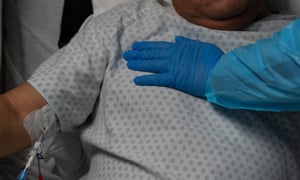Extract from The Guardian
About a third of 78 coronavirus patients treated by major Sydney hospital breathless, tired and in pain months later
More than a third of Covid-19 patients treated by a Sydney hospital during Australia’s first virus wave were still suffering symptoms including fatigue, chest pain and breathlessness months after their infection.
A paper published online by the Medical Journal of Australia (MJA) tracked 78 adults with Covid who were treated by St Vincent’s hospital between April and June.
The ongoing ADAPT study, led by Prof Gail Matthews and Dr David Darley, found: “A considerable proportion of patients experience persistent symptoms after Sars-CoV-2 [Covid-19] infection including fatigue, chest pain and breathlessness.
“Although more common following severe illness, 35% of community-managed patients within ADAPT have persistent symptoms several months post infection.”
Of the 78 patients, 69 were managed in the community, while nine were admitted to hospital including two to intensive care.
While the sample size is small, it is the largest Australian cohort study of Covid-19 patients published to date.
Darley told Guardian Australia that eight of the patients still had abnormally low total lung capacity, four months after being infected.
“In patients hospitalised for Covid that’s something that needs to be looked at as it may indicate early scarring of the lungs,” Darley said.
“Scarring, usually, is irreversible and we don’t know whether the scarring associated with Covid could be progressive or not. Sometimes you can have reduced lung capacity just because you’ve been sick and inactive … but it won’t always be reversible and so doctors should be looking out for this.”
In about 16% of patients, the efficiency of moving gas in and out of the blood was also reduced, the researchers found. But Darley said it was reassuring that the majority of patients with mild and moderate cases of the virus, who did not require hospital admission, had normal lung function three months after infection.
The average age of the patients was 47, and 39 of them acquired their infection overseas. The most common self-reported medical comorbidities were hypertension and asthma, while 37 patients had no underlying health conditions.
The paper is the first in a series to be published by the researchers and more data will be added as the patients are followed over time. It will also study the mental health of the patients.
“We are concerned about the mental health of some patients who have needed quite a lot of help since their diagnosis,” Darley said. “It’s been really distressing for them to have a pandemic virus and to not know what they might expect, and also the stigma of having had a virus and the worry that comes with that about being part of transmission.”
The researchers are also in talks with hospitals in Melbourne, which experienced a significant second wave of the virus, and hope to eventually combine the data to better reveal the Australian experience of Covid.
The director of the infection prevention and healthcare epidemiology unit at Alfred Health in Melbourne, Prof Allen Cheng, said the findings sounded consistent with what Victorian doctors were seeing.
“The question is are these symptoms unique to Covid?” he said. “For example, ongoing fatigue is something seen with any severe illness, and Covid can be pretty severe. After pneumonia we routinely tell patients: ‘You’re not getting back to normal for at least six weeks.’”

No comments:
Post a Comment